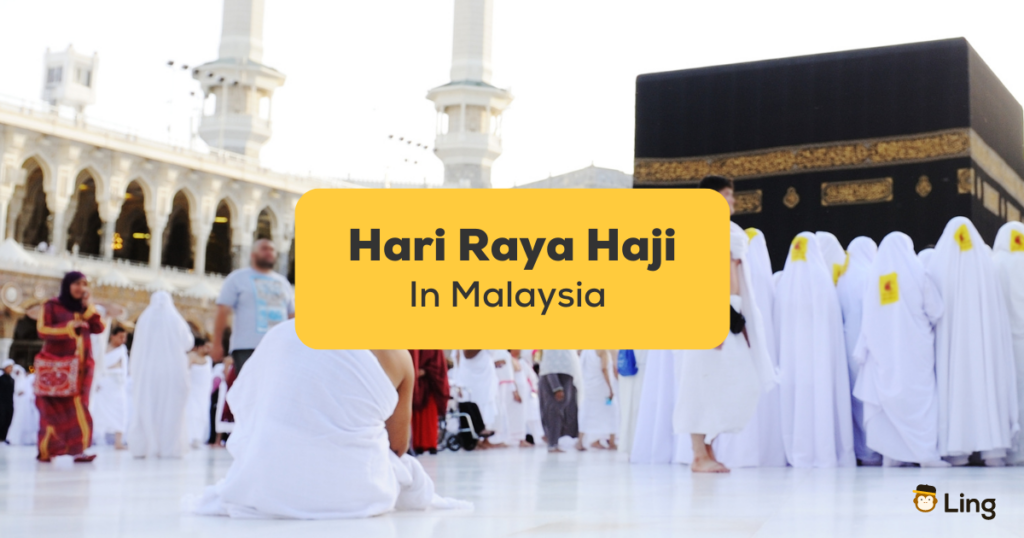Have you heard of Hari Raya Haji? This significant day is celebrated by Muslims all around the globe. It’s one of the highlighted celebrations in the Islamic calendar. If you have Muslim friends, and this special occasion happens to be just around the corner, go ahead and wish them Selamat Hari Raya Haji!
Similar to any festive celebration, observing this meaningful day involves some special preparations by those who celebrate it. Do you know that this celebration is also known by several other names? Let’s dive into the details and understand the what, why, and how of Hari Raya Haji.
Table Of Contents
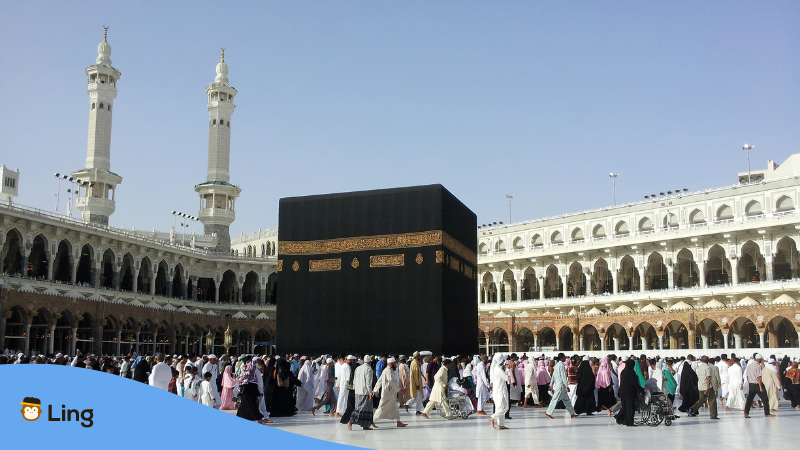
What Is Hari Raya Haji?
Hari Raya Haji is one of the two official (and crucial) celebrations for Muslims, aside from the famous Eid ul-Fitr. It falls on the 10 Zulhijjah — the final month of the Islamic calendar.
In Malaysia, the date of 10 Zulhijjah is proclaimed a national holiday. It’s also one of the most prominent dates in Islam as it brings together the main deeds in Islam: praying, fasting, almsgiving, and performing the Hajj. Performing all these on this particular date grants Muslims a greater reward than martyrdom since the combination of these practices doesn’t occur on other days.
In addition, this celebration is used interchangeably with two other terms: Eid al Adha (or its Malay version, Hari Raya Aidiladha) or Hari Raya Qurban.
The History Of Hari Raya Qurban
1. Story Of Ibrahim And Ismail
Hari Raya Aidiladha commemorates one historical event in Islam — qurban. This Arabic word, present in the Islamic scriptures, means sacrifice. It directly refers to the ritual sacrifice of a livestock animal that takes place during this day, leading us to the story of Prophet Ibrahim and his son, Ishmael (or Ismail), who is also a Prophet.
During the time of Abraham, God told him to slaughter his beloved son as a sacrifice. This was clearly a test to see how the prophet would respond to the divine command. Prophet Ibrahim was ready to make the sacrifice to prove his absolute faith and obedience as a prophet. As he was bout to commit the act, God rewarded Ibrahim’s undivided submission and willingness through this loving act: replace Ishmael, the beloved son, with a sheep instead — seconds before the sacrifice happened.
This remarkable moment is why the Eid ul-Adha celebration holds such deep religious and spiritual meaning for the Muslim community. This explains why the qurban ritual is the main part of this festive event. It acts as a reminder to submit oneself entirely to God, signifying the importance of selflessness, humility, and gratitude, as exemplified by Ibrahim.
2. Connection To Hajj
The word Haji in Hari Raya Haji itself refers to pilgrimage, or the Arabic word, Hajj. As one of the five pillars of Islam, Muslims must perform a pilgrimage to Mecca once they’ve met all the established requirements. Deemed as the pinnacle of a Muslim’s devotion to God, this deed can only be performed within the Haji season, which falls on the month of Zulhijjah. This is why this particular Islamic month can be really exciting for many Muslims as they finally get to carry out this ultimate deed.
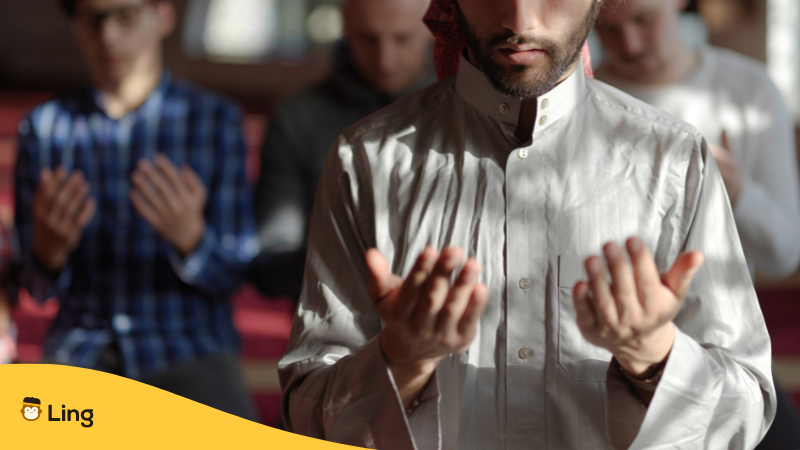
The Celebration Of Hari Raya Haji
Early Raya Preparation
Like any other cultural or religious festival in Malaysia, preparations for this exact date must be made early on. In reality, the livestock involved in the urban, including cows and sheep, are funded or contributed by members of a neighborhood. The mosque of that residential area will typically set up a committee for this function—they’ll pool the funds and purchase the livestock from local herdsmen.
Cleaning the house, buying new clothes, and preparing Hari Raya dishes are also some of the things we do one week in advance. There are some best practices, especially for those who’ve financially contributed to the livestock for the qurban. Aside from fasting in the days leading up to the holiday, it is not suggested for one to cut nails or pluck (or shave) any hair from 1 Zulhijjah until the day of the sacrifice (10 Zulhijjah). Why? This is to make sure that as the qurban takes place, one’s sins (from every part of their body, including hair and nails), will be cleansed and protected from hellfire.
Morning Prayers
Every Muslim starts the day by performing a special prayer. Before doing that, it has always been best to wear new, clean clothes and smell nice (put on perfume).
The Qurban Ritual
Once the prayer is done, people will start preparing for the qurban activity. All livestock must already be at the designated place, with the committee in charge ready to lead the ritual. Other members of the residential area (typically men) are present to help. The others, like women and children, are usually on the sidelines. As the sacrifice takes place, the phrase Allahuakbar is chanted, with hopes that this act of devotion is accepted and benefits those in need.
Charity
Once the slaughter is all done, the halal meat will be distributed to local Muslims; families, neighbors, and the less fortunate as an act of charity, compassion, and selflessness.
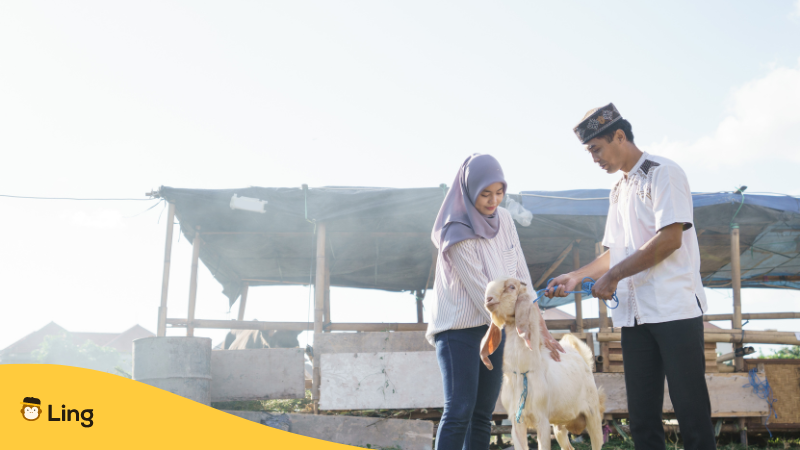
How Hari Raya Aidiladha Is Celebrated In Malaysia
Hari Raya Aidilfitri, which marks the end of the fasting month, and Hari Raya Aildiladha, which welcomes pilgrims to the Mecca, are both public holidays in Malaysia. The local mosques become very lively, especially as these two events are around the corner.
In Malaysia, people will go back to their parents’ place, if not their hometown, to spend Hari Raya Korban together. If you’re not familiar with the traffic congestion situation here in Malaysia, here’s a local tip — the traffic jam can be absolutely overwhelming at times. So, be strategic, check the Malaysia calendar, and be sure of the holidays happening here before getting your flight tickets. And apparently, this doesn’t only happen in this country. Those who celebrate this festive event are also affected, like the people in Singapore. And the best thing about gathering with families is the chance to feast on Hari Raya food and dishes; yummy!
Other than that, many Malaysian pilgrims will fly to Mecca and perform the Hajj during this holiday. Many people went there this year to really take advantage of the rewards promised to them in this life and the hereafter, completing the final pillar of Islam.
How Do You Say Eid In The Malay Language?
In Malay, Eid (which means festival or celebration) is easily translated to Hari Raya.
Since there are two types of Eid celebrations, you’ll need to know which one you want to say.
Eid al Adha is a festivity during which a livestock ritual sacrifice is performed. And in Malay, it’s called Hari Raya Aidiladha, Hari Raya Qurban, or Hari Raya Haji.
Eid ul fitr, the one that marks the end of the holy month, Ramadan, is called Hari Raya Aidilfitri, or Hari Raya Puasa.
Important Vocabulary For Hari Raya Aidiladha
| English | Malay |
|---|---|
| Historical account | Peristiwa |
| Perform Hajj | Menunaikan haji |
| Visiting | Ziarah-menziarahi |
| Sacrifice ritual | Ibadah qurban |
| Slaughter | Sembelih |
| Cattle | Lembu |
| Goat | Kambing |
| Mosque | Masjid |
| The poor and needy | Fakir miskin |
| Meat | Daging |
| Islamic calendar | Kalendar Islam |
| Traffic congestion | Kesesakan lalu lintas |
| Charity | Sedekah |
| Fast | Puasa |
Frequently Asked Questions For Hari Raya Aidiladha
What Do Malays Do On Hari Raya Haji?
On this day, we go to the mosque to perform a special prayer (solat sunat), witness (if not participate) the qurban activity, cook basic Raya food, and visit families and relatives.
What Is The Difference Between Hari Raya Puasa And Hari Raya Haji?
Hari Raya Puasa celebrates the end of the fasting month, while Hari Raya Haji falls on the month that welcomes Muslim pilgrims to the Mecca, and it’s also when the qurban ritual happens.
Do Muslims Fast Before Hari Raya Haji?
Yes, it is highly recommended to fast before the festival as the reward is greater than usual. But not everyone fast, though; only those who want to gain the rewards will do so.
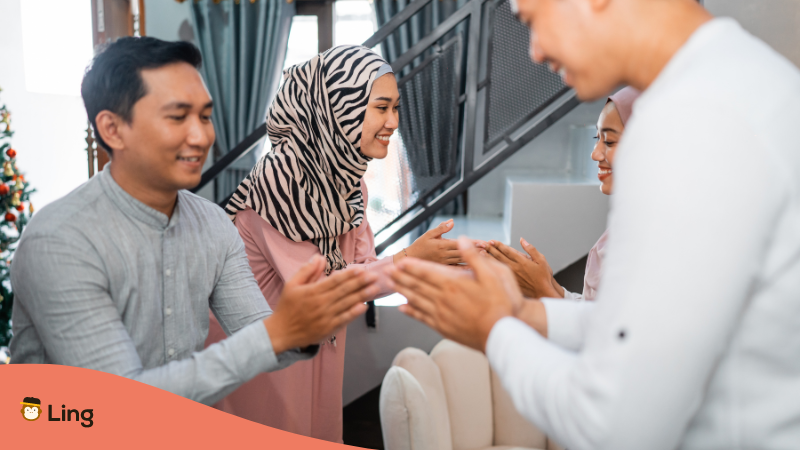
Embracing The Spirit Of Hari Raya Qurban
Exploring different cultures can be very enlightening and educational. Today, it’s crystal clear that Hari Raya Aidiladha is more than just a religious observance; it’s a powerful reminder of the values of selflessness, faith, and devotion. It lets one reflect on our willingness to make sacrifices for the greater good and support the less fortunate. The next time you’re traveling to Malaysia, avoid any surprises, and be sure to check for any upcoming festivals or holidays to ensure your plans go smoothly!
